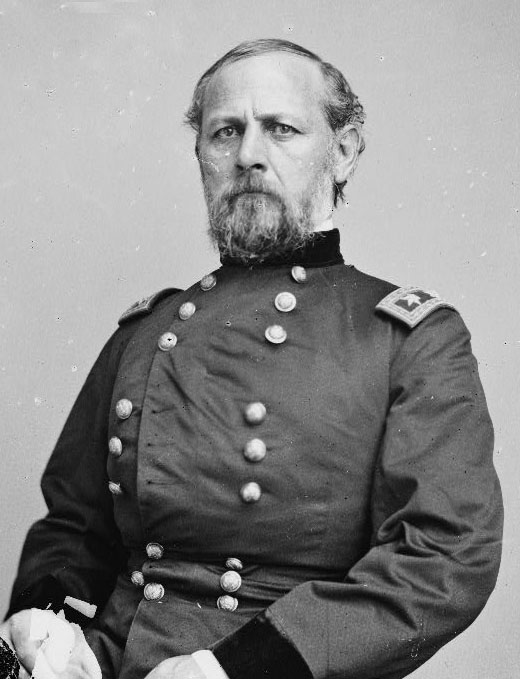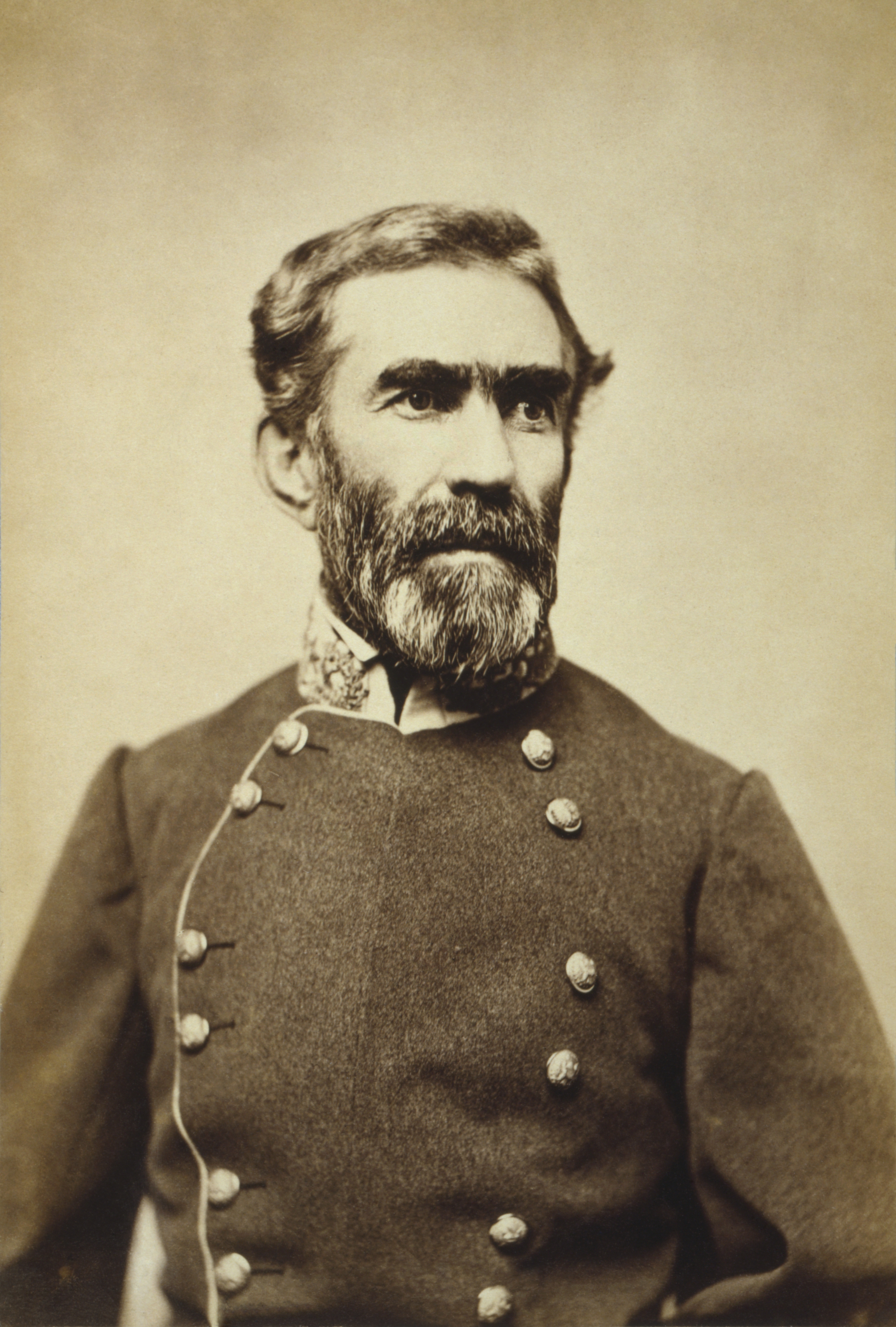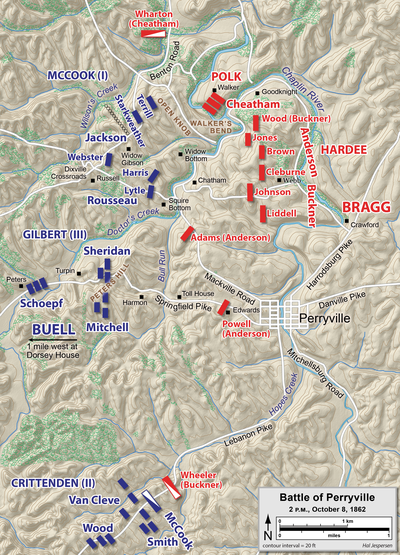 |
| Buell |
Buell left Louisville on October 1st. He had 75,000 freshly reorganized men, significantly more than Smith and Bragg combined. He organized his 10 divisions into three corps, the first under Alexander McCook, a seasoned army officer, the second under Thomas Crittenden, whose brother was a general on the Confederate side, and the third under Charles Gilbert. Gilbert's promotion was very bizarre. Just days before he had been only a captain. But one of Buell's subordinates was badly wounded during the Battle of Richmond and a replacement was needed. Several generals refused the position, so Buell decided to promote Gilbert to a Major General over the heads of many others because he had some experience. His promotion was later denied by Congress. Buell's forces marched in three columns so as to confuse Bragg of their true purpose. The federals came in contact with Bragg at 1 PM on October 4th, the noise of cannon interrupting the inauguration ceremony of Richard Hawes as Confederate governor of Kentucky.
 |
| Bragg |
Bragg decided to concentrate his forces at Perryville and fight Buell. Buell arrived at Perryville with the head of his column on October 7th, but neither army was present on the field in its entirety. Bragg ordered his troops to march on Perryville and attack the next day, October 8th, hoping to strike the confederates before they could bring up their entire army. However, further developments caused him to push that date out to October 9th. He ordered his corps commanders to avoid a general engagement and retired to his headquarters, unable to oversee the positioning of his army due to a fall from his horse.
The Battle of Perryville began on the morning of October 8th as Yankee troops pressed towards the Confederates under Hardee. The battle began over water. At the time there was a drought in Kentucky, and the Union soldiers were very thirsty. The Confederates were driven from the water, and Buell positioned his forces in preparation to attack Hardee the next day. Bragg arrived at Perryville and, conferring with Hardee, decided to attack on the Union left.
The greybacks moved forward at 1 pm, undetected by the Federals. Advancing, they hit McCook's Federals as they were deploying, having just arrived on the field. Letting out their rebel yell, the Confederates quickly crushed the first brigade of green troops, its commander falling dead, and continued to press on, assaulting the next units they encountered. The Confederate artillery pounded the fleeing Yankees, and McCook soon found both of his divisions in full flight. McCook requested that Gilbert, to his right, send him reinforcements. The Confederates facing Gilbert were very weak, but the inexperienced commander had not been able to discover that, and he refused aid. The Confederates on the southern portion of the field kept his 20,000 men occupied with just more than a tenth of that number. Buell was of no help, for through a strange trick of the terrain the noise of the battle did not reach his headquarters, even though they were close by.
Having attained much success, the rebel attack became disorganized in their rapid advance as they began taking fire from the Union artillery. The fighting became confused, and many instances of friendly fire and confused identity occured. Confederate General Polk captured a Union brigadier who thought Polk was his commander, and Polk was later almost captured himself when he mistook a Federal brigade for his own.
The battle was very trying for the troops. Sam Watkins, private from the 1st Tennessee remembered his experiences in his famous book Co. Aytch:
We did not recoil, but our line was fairly hurled back by the leaden hail that was poured into our very faces. Eight color-bearers were killed at one discharge of their cannon. We were right up among the very wheels of their Napoleon guns. It was death to retreat now to either side. Our Lieutenant-Colonel Patterson halloed to charge and take their guns, and we were soon in a hand-to-hand fight – every man for himself – using the butts of our guns and bayonets ... Such obstinate fighting I never had seen before or since. The guns were discharged so rapidly that it seemed the earth itself was in a volcanic uproar. The iron storm passed through our ranks, mangling and tearing men to pieces. The very air seemed full of stifling smoke and fire which seemed the very pit of hell, people by contending demons…
The day finally drew to the close, with the Federals driven back, but not whipped. Buell had allowed himself to be mauled by a force one third of his size. 4200 Federals and 3400 Confederates fell in this battle. Bragg had done well in the conduct of the battle itself, but he did not want to press the fight. He pulled his men out after midnight to link up with Kirby Smith.
Smith urged Bragg to attack Buell, and Bragg agreed to do it. However, the prospective attack never came to be. Braxton Bragg changed his mind and decided to withdrawl instead. He explained his position by saying:
With the whole southwest... in the enemy's possession, my crime would have been unpardonable had I kept my noble little army to be ice-bound in a northern clime, without tents or shoes and obliged to forage daily for bread.It was here that Bragg made his fundamental mistake of the campaign. He had done well in his advance, making his way all the way through Kentucky. He had crushed one wing of Buell's army with a much smaller force. But when the critical time came he would not risk another battle. He withdrew instead, bringing with him the huge number of supplies he had captured. While it was a very successful raid, it was a failure as a campaign. He said:
Though compelled to yield to largely superior numbers and fortuitous circumstances, a portion of the valuable territory from which we had driven the enemy, the fruits of the campaign were very large and have had a most important bearing upon our subsequent military operations here and elsewhere.With the campaign over, both generals were reprimanded by their superiors. Bragg was called to Richmond by Davis, who although he had received letters from his subordinates asking that he be removed from command, allowed Bragg to keep his army. Buell on the other hand was removed from command and replaced by Major General William Rosecrans.







0 comments:
Post a Comment